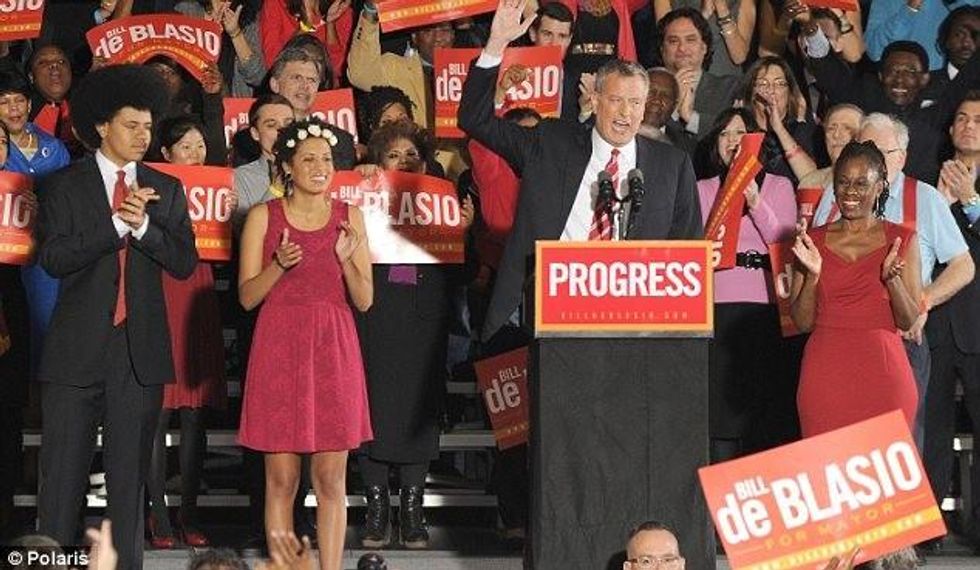

SUBSCRIBE TO OUR FREE NEWSLETTER
Daily news & progressive opinion—funded by the people, not the corporations—delivered straight to your inbox.
5
#000000
#FFFFFF
To donate by check, phone, or other method, see our More Ways to Give page.


Daily news & progressive opinion—funded by the people, not the corporations—delivered straight to your inbox.
Pundits who are already describing the victories of Terry McAuliffe in Virginia and Chris Christie in New Jersey as a "return to the center" of American politics are confusing the "center" with big business and Wall Street.

A few decades ago McAuliffe would be viewed as a right-wing Democrat and Christie as a right-wing Republican. Both garnered their major support from corporate America, and both will reliably govern as fiscal conservatives who won't raise taxes on the wealthy.
Both look moderate only by contrast with the Tea Partiers to their extreme right.
The biggest game-changer, though, is Bill de Blasio, the mayor-elect of New York City, who campaigned against the corporatist legacy of Michael Bloomberg -- promising to raise taxes on the wealthy and use the revenues for pre-school and after-school programs for the children of New York's burdened middle class and poor.
Those who dismiss his victory as an aberration confined to New York are overlooking three big new things:
First, the new demographic reality of America gives every swing state at least one large city whose inhabitants resemble those of New York.
Second, de Blasio won notwithstanding New York's position as the epicenter of big business and Wall Street, whose money couldn't stop him.
Third, Americans are catching on to the scourge of the nation's raging inequality, and its baleful consequences for our economy and democracy.
Dear Common Dreams reader, The U.S. is on a fast track to authoritarianism like nothing I've ever seen. Meanwhile, corporate news outlets are utterly capitulating to Trump, twisting their coverage to avoid drawing his ire while lining up to stuff cash in his pockets. That's why I believe that Common Dreams is doing the best and most consequential reporting that we've ever done. Our small but mighty team is a progressive reporting powerhouse, covering the news every day that the corporate media never will. Our mission has always been simple: To inform. To inspire. And to ignite change for the common good. Now here's the key piece that I want all our readers to understand: None of this would be possible without your financial support. That's not just some fundraising cliche. It's the absolute and literal truth. We don't accept corporate advertising and never will. We don't have a paywall because we don't think people should be blocked from critical news based on their ability to pay. Everything we do is funded by the donations of readers like you. Will you donate now to help power the nonprofit, independent reporting of Common Dreams? Thank you for being a vital member of our community. Together, we can keep independent journalism alive when it’s needed most. - Craig Brown, Co-founder |

A few decades ago McAuliffe would be viewed as a right-wing Democrat and Christie as a right-wing Republican. Both garnered their major support from corporate America, and both will reliably govern as fiscal conservatives who won't raise taxes on the wealthy.
Both look moderate only by contrast with the Tea Partiers to their extreme right.
The biggest game-changer, though, is Bill de Blasio, the mayor-elect of New York City, who campaigned against the corporatist legacy of Michael Bloomberg -- promising to raise taxes on the wealthy and use the revenues for pre-school and after-school programs for the children of New York's burdened middle class and poor.
Those who dismiss his victory as an aberration confined to New York are overlooking three big new things:
First, the new demographic reality of America gives every swing state at least one large city whose inhabitants resemble those of New York.
Second, de Blasio won notwithstanding New York's position as the epicenter of big business and Wall Street, whose money couldn't stop him.
Third, Americans are catching on to the scourge of the nation's raging inequality, and its baleful consequences for our economy and democracy.

A few decades ago McAuliffe would be viewed as a right-wing Democrat and Christie as a right-wing Republican. Both garnered their major support from corporate America, and both will reliably govern as fiscal conservatives who won't raise taxes on the wealthy.
Both look moderate only by contrast with the Tea Partiers to their extreme right.
The biggest game-changer, though, is Bill de Blasio, the mayor-elect of New York City, who campaigned against the corporatist legacy of Michael Bloomberg -- promising to raise taxes on the wealthy and use the revenues for pre-school and after-school programs for the children of New York's burdened middle class and poor.
Those who dismiss his victory as an aberration confined to New York are overlooking three big new things:
First, the new demographic reality of America gives every swing state at least one large city whose inhabitants resemble those of New York.
Second, de Blasio won notwithstanding New York's position as the epicenter of big business and Wall Street, whose money couldn't stop him.
Third, Americans are catching on to the scourge of the nation's raging inequality, and its baleful consequences for our economy and democracy.